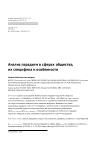The analysis of paradigms in the spheres of society, their specifics and features
DOI: 10.33917/mic-1.120.2025.5-13
The purpose of the study is to analyze the paradigms of the subsystems of society with the identification of their specifics and features. The types of society are considered through the prism of its economic, social, political and spiritual development. The stages of development of the paradigm are shown in the changing structure of the economy. The systemic interrelation of paradigms in the context of the specifics and features of their evolution is revealed. The idea of a structural hierarchy of subsystems of society for understanding and solving problems of interaction of paradigms is proposed. The specifics and features of the paradigms of the subsystems of society and ways to smooth out contradictions and conflicts of paradigms are determined.
References:
1. Bell D. The Coming Postindustrial Society: An Experience of Social Forecasting / Translated from English, edited by V.L. Inozemtsev. Moscow: Academia, 2004. 783 p.
2. Zaitsev A.K. Social Conflict. 2nd Edition. Moscow: Academia, 2001. 464 p.
3. Zborovsky G.E. Theory of Social Community. Yekaterinburg: Humanitarian University, 2009. 300 p.
4. Comte O. The Spirit of Positive Philosophy. (A Word on Positive Thinking) / Translated from French by I.A. Shapiro. Rostov n / D: Phoenix, 2003. 256 p.
5. Kravchenko S.A. Formation of a Complex Society: Towards a Substantiation of a Humanistic Theory of Complexity. M.: MGIMO-University, 2012. 306 p.
6. Kuzin I.V. Paradigmatic delusions in the fate of rationalism. St. Petersburg: RHGA, 2020. 252 p.
7. Morozov V.A. Spiritual economy and compatibility of society: compatibility theory. M.: Publishing and trading corporation “Dashkov and Co.”, 2022. 577 p.
8. Ritzer J. Modern sociological theories / Trans. from English by A. Boykov A. Lisitsyna. 5th ed. M.: Piter, 2002. 686 p.
9. Toshchenko Zh.T. Sociology of life. Moscow: UNITY, 2016. 399 p.





